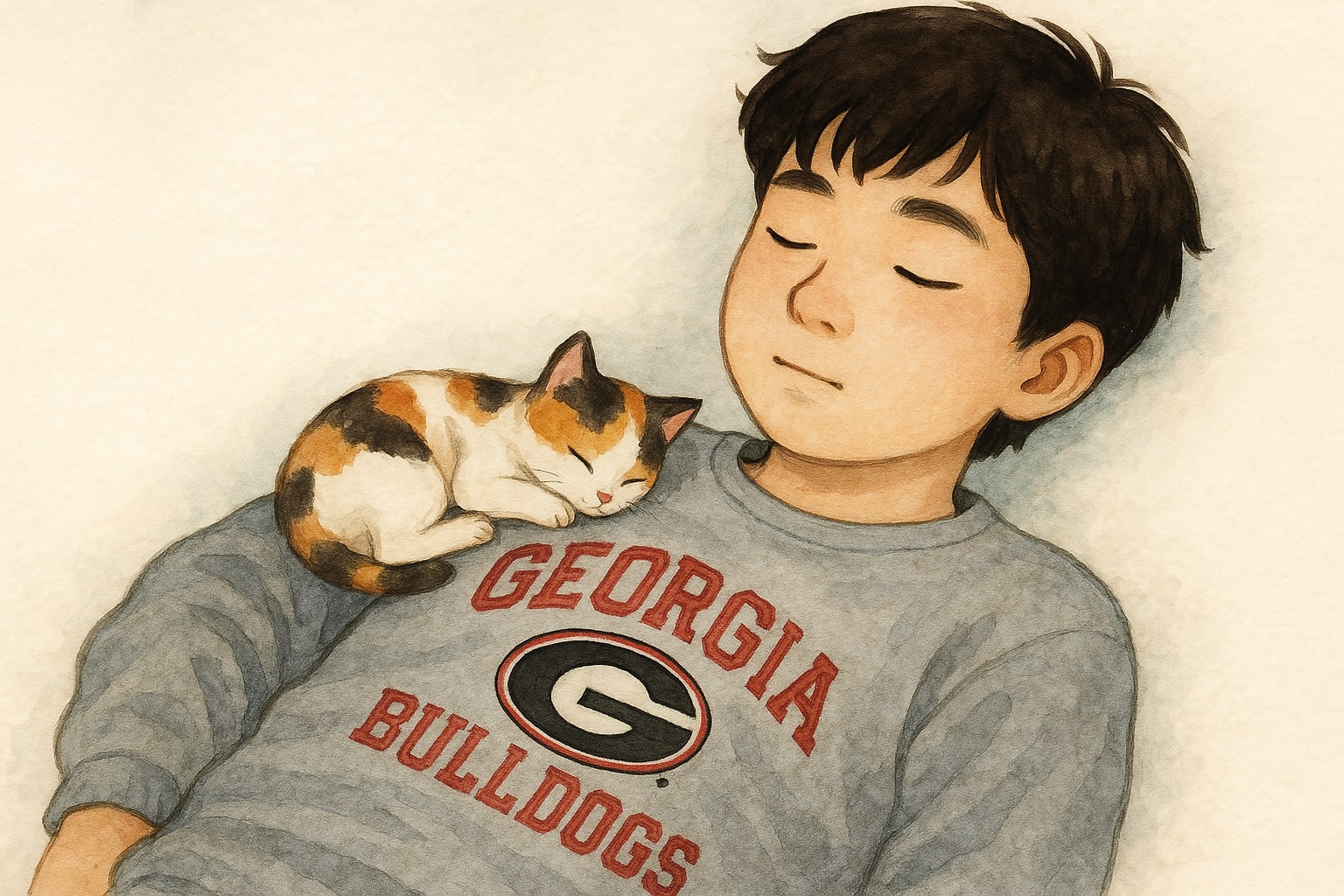A Most Humble Methodist
🦋🦋🦋
Although Mom and I sat in the living room as adversaries at this pivotal moment, both anxiously awaiting the consequential outcome that would send one of us soaring to cloud nine and the other plummeting into the depths of despair, there wasn’t a person on earth I loved and admired more than her.
Raised in the aftermath of the Korean War, Mom, like many of her contemporaries, was unable to receive a proper education and had to eke out a living from an early age. But she refused to remain tethered to either material or intellectual impoverishment, working full-time during the day and attending night schools in the evenings to earn her middle and high school diplomas.
An eternal optimist who believed that the light at the end of the tunnel would be extra bright and colorful for her, she green-lighted Dad’s immigration plan, not for her own benefit but with the singular conviction that the move would vastly improve her children’s prospects, particularly in terms of educational opportunities.
Despite her ambitions, she wasn’t one of those stereotypical tiger moms who relentlessly prodded and propelled her children to burrow into academics. From when we were young, she matter-of-factly conveyed to us that she and Dad wouldn’t meddle with our studies, pledging only that they would provide a stable, warm home environment and an endless supply of encouragement, love, and support. The rest was left in our hands.
Mom kept her end of the bargain, never once inquiring about our school report cards or dictating what we should or shouldn’t do when it came to our life choices, be it our aspirations, college preferences, career paths, or preferred living locales. Her parenting philosophy undoubtedly played an instrumental role in all four of us maturing into independent-minded and self-reliant individuals by the time we each headed off to college.
She did impose one strict rule, though: become habitual readers of newspapers, magazines, and books to “learn why the world wags and what wags it.” Mom saw books as gateways through which we could journey across diverse minds, thereby gaining insights into their unique perspectives and interpretations of life, death, and love. To her, books weren’t just inanimate objects but catalysts that fostered the growth of empathy, promoting a deeper understanding of our shared human experience. She encouraged us to think expansively and to venture out of her nurturing nest to explore bigger and far more exciting worlds as soon as we graduated from high school.
🦋
Mom was the only religious person in our family. Granted, we all attended church, but not necessarily out of personal conviction. Our attendance, in essence, was a tender act of support for her. Put simply, nothing brought more joy to this devout Methodist than seeing her children immaculately dressed in dapper attire on Sunday mornings for the church service. No one in our family wanted to deprive her of this small pleasure in her life, not when she worked her fingers to the bone from morning to night for the family.
Mom also seldom missed the weekday early morning prayer service at 5:30. Rain, snow, sleet, it didn’t matter. More often than not, she was the sole attendee, sitting in the stillness of the empty rows of chestnut-colored pews, eagerly taking in the sermon delivered by the half-awake minister. Even after he had retired from the pulpit, she would remain in her seat to pray earnestly for her children’s safety and humility, nothing more.
Once I turned 16 and obtained my driver’s license, on mornings when she was under the weather, she would wake me gently and ask me to drive her to the church. Concerned, I’d sit with her throughout the service, holding her hand to ensure she was alright.
Each night, she diligently studied the Bible, often requesting my presence to help decipher complex passages or for lively discussions about her recent readings. Although she spoke measuredly during our dialogues, I could tell her brain was rapidly firing on all cylinders.
Among our many memorable exchanges, I still vividly recall our lengthy, spirited debate concerning the biblical figure Job, known as Ayyūb in the Qur’an and Iyov in the Torah. He was a man who, despite enduring many years of suffering through no fault of his own, remained steadfast in his faith, ultimately leading a blessed life. The Book of Job is my favorite piece in the Bible because it imparts a vital life lesson in my secular perspective: life’s painful adversities, whether unforeseen or self-inflicted, are virtually inevitable, but there is beauty, and nobility, in persevering through and eventually overcoming these trials to reach one’s potential.
I truly cherished our nightly discourses held under the warm glow of the large terracotta pendant light suspended above the center of our dining table. To better accompany Mom on her spiritual journey, I pushed myself to become well-versed in the Bible. On certain Saturdays, comfortably ensconced in a corner of a Barnes & Noble bookstore, I would spend the entire day reading theology books.
It hardly mattered that I did not believe in religion. Mom found peace, solace, and purpose through her Christian faith, and that was enough for me, simply because of the immense love I had for her. Even after I moved away from home, the physical distance did not impede our spiritual conversations, as we’d communicate over the phone three to four times a week.
Mom also showed interest in exploring other religions as she aged, which compelled me to delve into the Qur’an and Buddhist literature. She drew as much inspiration from the teachings of love and compassion expounded by Prophet Muhammad and Buddha as she did from the words of Jesus. Indeed, the recurring themes of peace, love, and kindness woven into the doctrines of these religious teachers deeply touched me as well. She even read and developed an appreciation for the philosophies of the Enlightenment thinkers.
Mom held particular reverence for the writings of Bŏpjŏng, a Korean Buddhist monk. His discourse on the splendor of nature, the necessity of harmony among people and the world, and the importance of renouncing material obsessions to liberate ourselves from unnecessary attachments struck a profound chord within her. This was especially true because she aspired for her children to lead humble lives.
🦋
Whenever she came across a moral piece, whether of a spiritual or secular nature, that was centered around the theme of living without material greed, she eagerly shared it with me. Among these, a short story by the German novelist Heinrich Böll stands out, and continues to resonate with me. What follows is my interpretation of it, seasoned with my own spice of composition to give the old allegory a new, modernistic flavor:
On a warm, sunny day, a tourist was strolling through a picturesque fishing village, tranquil and charming. He spotted a fisherman enjoying a relaxed nap in a modest fishing boat beneath an ultramarine sky. The peaceful scene was soon interrupted by the loud “clack, clack” of the tourist’s polished Oxford shoes echoing on the wooden wharf, awakening the fisherman. They exchanged pleasantries.
“Why aren’t you out at sea catching fish?” the city tourist asked abruptly.
“Ah, I went out early this morning and fished for seven hours. Caught enough for the day. I was just catching a short siesta. Now, I’m going to head home for a late lunch and then play with my daughter when she’s back from school. Later, when my wife returns from work, we plan to have dinner with some neighborhood friends, maybe share some wine and stories,” the fisherman thoroughly replied with a gentle tone.
The tourist, looking bemused, pressed on, “Why not fish more while the day’s still young?”
“Why would I? I want to spend time with my family.”
“But think about it. The more fish you catch, the more money you’d make. Soon you’d afford a much better and bigger boat, eventually, a fleet,” the tourist responded quickly as if it was all too obvious.
“And then?”
“With that kind of setup, you could catch fish in bulk, maybe even start a company in the city. And if things go well, you could take it public. Say hello to IPO-generated capital!”
The fisherman raised an eyebrow, “But what if we overfish? The local marine ecosystem might collapse.”
The tourist waved him off, “Expand your horizons. Go out to the open ocean and rake in all the fish there. And once you’re listed in the open stock market, you’d have access to loans, investor funds, and tax breaks. You can then diversify your business. Do this for two decades or so, and you’ll be rolling in wealth.”
“I see. Nevertheless, can you tell me how my life will be better than it is now if I do become super-rich?” the fisherman inquired earnestly.
“Well, no more long working days, for one, and you can now rest as much as your heart desires. Imagine lounging at a warm idyllic resort in the Bahamas, napping under the cloudless deep blue, carefree. Wouldn’t that be wonderful?”
The fisherman reflected for a few seconds before commenting, “Well, isn’t my life already like that, except for the resort part?”
🦋
Unfortunately, as Mom aged, she battled a health condition that gradually impaired her eyesight, hampering her ability to read the Bible and other theological texts as much as she’d have liked. With each passing year—as her need for increased Bible font size grew—I’d go to this sizable Christian bookstore located in the bustling Gwanghwamun area of Seoul, my place of residence and work since my late twenties. This store, stocked with Korean Bibles in no fewer than seven different font sizes, ensured I could find exactly what she needed.
Heartbreakingly, it wasn’t just her eyesight that waned as the years wore on. Mom’s overall health progressively deteriorated over time, leaving her perpetually weak and frequently ill, a devastating reality to witness. Seeing your once vibrant parents gradually succumb to the frailties of old age is a sadness like no other. The year after I could no longer find a Bible with a larger font for her marked the same year my beloved mother passed away.

